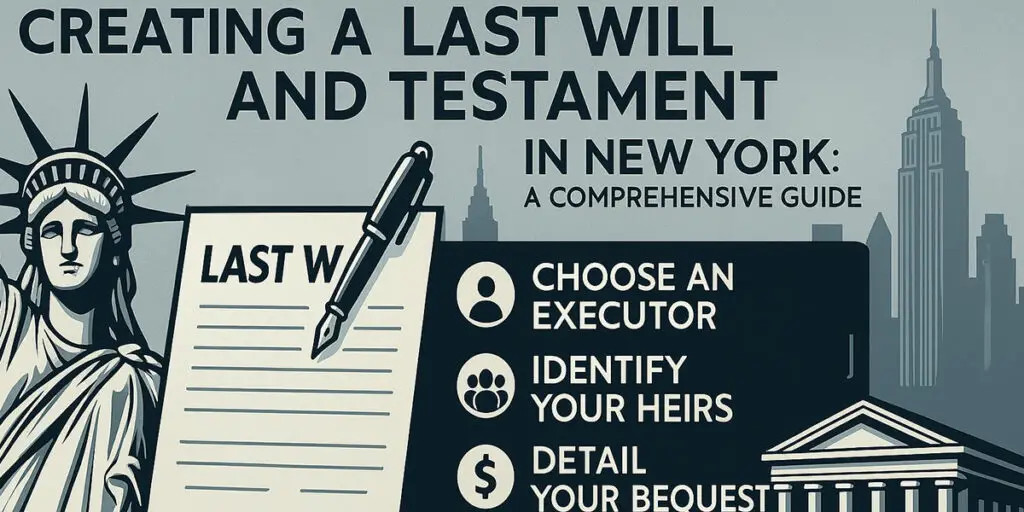Creating a Last Will and Testament in New York: A Comprehensive Guide
Planning for the future is a responsible act, and one of the most important steps you can take is creating a last will and testament. This legal document ensures that your assets are distributed according to your wishes after your death. Without a will, the state of New York will determine how your property is divided, which may not align with your intentions. Creating a will provides peace of mind, knowing that your loved ones will be taken care of and your legacy preserved. At Morgan Legal Group, we guide individuals and families throughout New York in creating comprehensive and legally sound wills. This guide provides essential information on creating a last will and testament in New York, from understanding the basic requirements to navigating the drafting and execution process. We aim to provide a clear understanding, while emphasizing the importance of professional legal guidance. The nuances of New York law require careful consideration to avoid potential complications and ensure your wishes are honored.
Why You Need a Last Will and Testament in New York
Having a last will and testament is crucial for several reasons. First and foremost, it allows you to direct the distribution of your assets. You can specify who receives what, whether it’s your spouse, children, other family members, friends, or charitable organizations. Second, a will allows you to nominate an executor, the person responsible for managing your estate and carrying out your wishes. This can save your family time and stress during a difficult period. Third, if you have minor children, a will allows you to name a guardian to care for them in the event of your death.
Without a will, the state of New York will determine who receives your assets according to its intestacy laws. This may not reflect your wishes, and it can lead to family disputes and complications. For instance, if you have a spouse and children, your assets will be divided between them according to a statutory formula, which might not be what you intended. Furthermore, if you have no surviving relatives, your assets could escheat to the state. A will avoids these uncertainties and ensures that your wishes are followed.
Essential Requirements for a Valid Will in New York
For a will to be valid in New York, it must meet specific legal requirements. These requirements are outlined in the New York Estates, Powers and Trusts Law (EPTL). First, the testator (the person making the will) must be of sound mind and have the legal capacity to make a will. This means they must understand that they are signing a document that will distribute their assets after their death, and they must understand the nature and extent of their property and the identity of their beneficiaries.
Second, the testator must be at least 18 years old. Third, the will must be in writing and signed by the testator. Fourth, the will must be witnessed by two individuals who are not beneficiaries under the will. These witnesses must also sign the will within 30 days of each other, attesting that the testator signed the will in their presence and that the testator appeared to be of sound mind. Strict compliance with these requirements is essential for the will to be admitted to probate. Failure to adhere to these requirements can invalidate the will.
Understanding Testamentary Capacity in New York
Testamentary capacity is a critical element for a valid will in New York. It refers to the testator’s mental ability to understand the nature and consequences of making a will. To have testamentary capacity, the testator must understand that they are signing a document that will distribute their assets after their death, the nature and extent of their property, and the identity of their beneficiaries. This doesn’t mean the testator must be a legal expert or have perfect mental clarity, but they must have a general understanding of these key elements.
If a testator lacks testamentary capacity, the will can be challenged in court. Evidence of mental incapacity, such as medical records, witness testimony, or prior legal determinations, can be used to challenge the will’s validity. It’s essential to ensure that the testator has testamentary capacity at the time the will is signed. If there are concerns about the testator’s mental capacity, it may be advisable to obtain a medical evaluation or consult with an elder law attorney. The legal team at Morgan Legal Group can provide invaluable guidance.
Drafting Your Last Will and Testament: Key Provisions
Drafting a will involves more than just stating who receives what. A well-drafted will should include several key provisions to ensure your wishes are clear and legally enforceable. These provisions include:
- Identification of the Testator: The will should clearly identify the testator by their full legal name and address.
- Declaration of Intent: The will should state that the document is the testator’s last will and testament and that they revoke any prior wills.
- Beneficiary Designations: The will should clearly identify the beneficiaries who will receive your assets. It’s important to use full legal names and addresses and to specify the assets each beneficiary will receive.
- Executor Nomination: The will should nominate an executor to manage your estate and carry out your wishes. You should also name a successor executor in case your first choice is unable or unwilling to serve.
- Guardian Nomination (if applicable): If you have minor children, the will should nominate a guardian to care for them in the event of your death.
- Specific Bequests: The will can include specific bequests, such as giving a particular piece of jewelry to a specific person.
- Residuary Clause: The will should include a residuary clause, which specifies how any assets not specifically mentioned in the will should be distributed.
- Tax Apportionment Clause: This clause specifies how estate taxes should be paid.
- Signature and Attestation: The will must be signed by the testator and witnessed by two individuals.
These provisions help ensure your will is comprehensive and legally sound, minimizing the risk of disputes or challenges. Due to the complexity of these provisions, it is best to seek legal assistance to ensure compliance with New York State Law.
Choosing Your Executor: Responsibilities and Considerations
Choosing your executor is one of the most important decisions you will make when creating your will. The executor is responsible for managing your estate, paying your debts and taxes, and distributing your assets to your beneficiaries. The executor has significant responsibilities and must be someone you trust to act in your best interests and the interests of your beneficiaries.
When choosing an executor, consider the following factors: their trustworthiness, organizational skills, financial acumen, and availability. It’s also important to choose someone who is willing to serve and who lives in a location that will allow them to effectively administer your estate. You should also name a successor executor in case your first choice is unable or unwilling to serve. Consider naming a corporate executor, such as a bank or trust company, particularly if your estate is complex or your family relationships are strained.
Proper Will Execution: The Attestation Clause and Witness Requirements
Proper will execution is essential for ensuring the validity of your will in New York. This involves adhering to specific legal requirements regarding the signing and witnessing of the will. The will must be signed by the testator in the presence of two witnesses, and the witnesses must also sign the will, attesting that the testator signed the will in their presence and that the testator appeared to be of sound mind.
The will should include an attestation clause, which is a statement at the end of the will that summarizes the execution requirements and confirms that they have been met. The witnesses should be disinterested, meaning they are not beneficiaries under the will. It’s also important to choose witnesses who are likely to be available to testify in court if necessary. Failure to comply with these execution requirements can invalidate the will, so it’s essential to follow them carefully. Morgan Legal Group can ensure that your will is executed correctly.
What Happens If You Die Without a Will in New York? (Intestacy)
If you die without a will in New York, you are considered to have died intestate. In this case, your assets will be distributed according to New York’s intestacy laws, which are outlined in the EPTL. The specific distribution will depend on your surviving relatives. If you have a spouse and children, your assets will be divided between them according to a statutory formula. If you have a spouse but no children, your spouse will inherit all of your assets. If you have children but no spouse, your children will inherit all of your assets.
If you have no spouse or children, your assets will be distributed to your other relatives, such as your parents, siblings, or more distant relatives, according to a specific order of priority. If you have no surviving relatives, your assets will escheat to the state. Intestacy can lead to unintended consequences and family disputes, so it’s always best to create a will to ensure your wishes are followed. Navigating probate without a will can be complicated.
Amending or Revoking Your Will: How to Make Changes
Your will is not set in stone. You can amend or revoke your will at any time during your lifetime, as long as you have testamentary capacity. There are two main ways to amend your will: by creating a codicil or by creating a new will. A codicil is a written amendment to your existing will. It must be signed and witnessed in the same manner as your original will.
Creating a new will involves drafting an entirely new document that revokes your prior will. The new will must also be signed and witnessed in the same manner as your original will. It’s important to review your will regularly and make any necessary changes to reflect changes in your life, such as marriage, divorce, birth of a child, or changes in your assets or beneficiaries. Failure to update your will can lead to unintended consequences and family disputes.
Will Contests in New York: Common Grounds for Challenges
Even with a properly drafted and executed will, there is always a risk that it could be challenged in court. Will contests are legal challenges to the validity of a will, and they can be costly and time-consuming. Common grounds for challenging a will in New York include:
- Lack of Testamentary Capacity: The challenger argues that the testator lacked the mental capacity to make a will at the time it was signed.
- Undue Influence: The challenger argues that the testator was unduly influenced by someone to make a will that did not reflect their true wishes.
- Fraud: The challenger argues that the will was procured by fraud or misrepresentation.
- Improper Execution: The challenger argues that the will was not properly signed and witnessed according to New York law.
To minimize the risk of a will contest, it’s important to ensure that your will is properly drafted, executed, and witnessed. It’s also important to address any potential concerns about your testamentary capacity or undue influence. Documenting your wishes and reasons for making certain decisions can also help defend against a will contest. Addressing the concerns of family members now can prevent a costly battle later.
The Difference Between a Will and a Trust in New York
While wills and trusts are both important estate planning tools, they serve different purposes and have different characteristics. A will is a legal document that directs the distribution of your assets after your death. It goes through probate, which is the legal process of validating and administering your estate. A trust, on the other hand, is a legal arrangement where you transfer assets to a trustee, who manages those assets for the benefit of one or more beneficiaries.
Trusts can be created during your lifetime (living trusts) or after your death through your will (testamentary trusts). Trusts can avoid probate, provide greater control over asset management, and offer asset protection benefits. Whether a will or trust is more appropriate depends on your individual circumstances, assets, and goals. Many people choose to utilize both a will and a trust in order to accomplish their planning objectives.
Integrating a Will with Other Estate Planning Documents
A will is just one piece of the estate planning puzzle. A comprehensive estate plan should also include other important documents, such as a durable power of attorney, a health care proxy, and a living will. A durable power of attorney allows you to appoint someone to manage your financial affairs if you become incapacitated. A health care proxy allows you to appoint someone to make health care decisions for you if you are unable to do so.
A living will allows you to express your wishes regarding medical treatment in the event of a terminal illness or injury. These documents work together to ensure that your wishes are respected and your affairs are managed according to your instructions, both during your lifetime and after your death. Proper integration of these documents helps accomplish your wishes.
Digital Assets and Your Will: Planning for the Digital Afterlife
In today’s digital age, it’s important to consider your digital assets when creating your will. Digital assets include online accounts, social media profiles, email accounts, and digital photos and videos. It’s important to include provisions in your will that address how you want your digital assets to be managed and distributed after your death. You should also provide your executor with the necessary information to access these assets, such as usernames, passwords, and security questions.
Failing to plan for your digital assets can create significant challenges for your family, as they may be unable to access important information or manage your online accounts. Consider using a digital asset planning tool or working with an attorney who specializes in digital estate planning. Planning for your “digital afterlife” helps to prevent many headaches and heartache for your loved ones.
Protecting Your Will: Storage and Accessibility
Once you have created your will, it’s important to store it in a safe and secure location where it can be easily accessed when needed. You should also inform your executor and other trusted individuals about the location of your will. Some common storage options include:
- Safe Deposit Box: A safe deposit box at a bank is a secure place to store your will, but it may be difficult for your executor to access the box after your death.
- Attorney’s Office: Your attorney may offer to store your will in their office for safekeeping.
- Home Safe: A home safe can provide secure storage, but it’s important to choose a fireproof and waterproof safe.
- With a Trusted Individual: You can give a copy of your will to a trusted individual, such as your executor or a family member.
Regardless of where you choose to store your will, it’s important to ensure that it is protected from loss, theft, or damage. Regular updates to trusted individuals can prevent issues later on.
The Importance of Regular Estate Plan Reviews
Your estate plan, including your will, should be reviewed and updated periodically to reflect changes in your life, family, and assets. Major life events such as marriage, divorce, birth of a child, death of a beneficiary, or significant changes in your financial situation should trigger a review of your estate plan. It’s also a good idea to review your estate plan at least every three to five years, even if there have been no major life changes. Regular reviews help ensure your plan continues to meet your goals.
During the review, your attorney can assess whether your current plan still meets your needs and make any necessary adjustments. Staying proactive can help ensure your wishes are honored and your loved ones are taken care of. A consultation with Morgan Legal Group can provide you with guidance in these matters.
Working with Morgan Legal Group: Your Trusted Estate Planning Partner in New York
Creating a last will and testament is a crucial step in planning for your future and protecting your loved ones. At Morgan Legal Group, we understand the importance of estate planning and are committed to providing personalized and effective legal services to individuals and families throughout New York. Our experienced attorneys can guide you through the process of creating a will, answering your questions, and addressing your concerns.
We take the time to understand your unique circumstances and goals, and we develop customized estate plans that meet your specific needs. Contact us today to schedule a consultation and learn how we can help you create a last will and testament that provides peace of mind and protects your legacy. View our Google My Business link for more information.
Morgan Legal Group proudly serves the New York City community including the Bronx, Brooklyn, NYC, Queens, and Staten Island. If you are outside of New York City we also serve Long Island including Suffolk County. As well as Westchester, Ulster County, and Orange County.NY Courts









